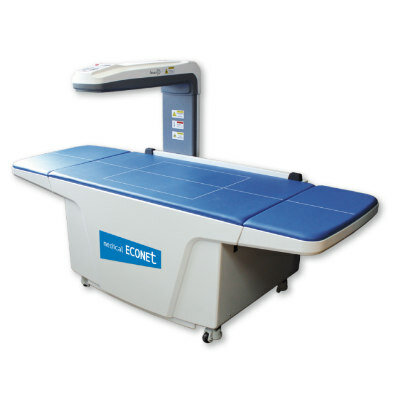Virtual Reality Game Improves Patient MRI Compliance 
|
By MedImaging International staff writers Posted on 19 Aug 2021 |

Image: A VR coloring game helps learn to remain still during an MRI (Photo courtesy of Reimagine Well)
A game played using a virtual reality (VR) headset helps patients undergoing a magnetic resonance imaging (MRI) scan fulfil stillness requirements and overcome their fears.
Developed by Reimagine Well (Laguna Beach, CA, USA), the MRI Stillness Game uses a VR headset to detect head movement during a pre-MRI training session, which rewards stillness, so that scans and radiation treatments can be as short and accurate as possible. The game is timed so that it lasts as long as the scheduled MRI scan, with the score climbing higher the longer the patient successfully remains motionless.
During the three-level VR game, patients are required to focus crosshairs inside a circle in order to colorize first a rainforest, then a hot air balloon scene, and finally a coral reef. Each level is designed to be longer and harder than the previous one, and, as they play, simulated MRI noises morph into part of the natural, surrounding environment, such as bird chirps or dolphin clicks. After each round, patients receive a score card on their performance.
“Often VR headsets are used in hospitals for distraction or entertainment purposes only. With this application, the patient is first acclimated to the sights and sounds of the MRI,” said Leonard Sender, MD, co-founder of Reimagine Well. “We believe clinicians will be able to correlate the scores in the game to the accuracy of the imaging and the duration of the patient MRI sessions. Our hope is that it will become an important predictive tool, shortening the duration of procedures and getting more utilization out of their MRI suites.”
“MRIs are frightening for everyone. Even when my patients overcome the fear, they have no way to practice being still, so that the scans, or radiation treatments, can be as short and accurate as possible,” said pediatric radiation oncologist Matthew David Hall, MD, of Miami Cancer Institute (FL, USA). “The goal is to help familiarize patients with the stillness requirement for an MRI exam, with the hope that their scores will predict with how well they will successfully complete a scan without moving.”
People undergoing a MRI scan often need to minimize movements for up to 10 minutes at a time to maximize scan quality and reduce artifacts. That can be quite challenging, and so 10 to 15% of all MRI scans need to be redone because of movement during the scan. The percentage of MRI scans that need to be redone may be even higher for young children and individuals with disabilities, who may need to be sedated during the scan.
Related Links:
Reimagine Well
Developed by Reimagine Well (Laguna Beach, CA, USA), the MRI Stillness Game uses a VR headset to detect head movement during a pre-MRI training session, which rewards stillness, so that scans and radiation treatments can be as short and accurate as possible. The game is timed so that it lasts as long as the scheduled MRI scan, with the score climbing higher the longer the patient successfully remains motionless.
During the three-level VR game, patients are required to focus crosshairs inside a circle in order to colorize first a rainforest, then a hot air balloon scene, and finally a coral reef. Each level is designed to be longer and harder than the previous one, and, as they play, simulated MRI noises morph into part of the natural, surrounding environment, such as bird chirps or dolphin clicks. After each round, patients receive a score card on their performance.
“Often VR headsets are used in hospitals for distraction or entertainment purposes only. With this application, the patient is first acclimated to the sights and sounds of the MRI,” said Leonard Sender, MD, co-founder of Reimagine Well. “We believe clinicians will be able to correlate the scores in the game to the accuracy of the imaging and the duration of the patient MRI sessions. Our hope is that it will become an important predictive tool, shortening the duration of procedures and getting more utilization out of their MRI suites.”
“MRIs are frightening for everyone. Even when my patients overcome the fear, they have no way to practice being still, so that the scans, or radiation treatments, can be as short and accurate as possible,” said pediatric radiation oncologist Matthew David Hall, MD, of Miami Cancer Institute (FL, USA). “The goal is to help familiarize patients with the stillness requirement for an MRI exam, with the hope that their scores will predict with how well they will successfully complete a scan without moving.”
People undergoing a MRI scan often need to minimize movements for up to 10 minutes at a time to maximize scan quality and reduce artifacts. That can be quite challenging, and so 10 to 15% of all MRI scans need to be redone because of movement during the scan. The percentage of MRI scans that need to be redone may be even higher for young children and individuals with disabilities, who may need to be sedated during the scan.
Related Links:
Reimagine Well
Latest MRI News
- PET/MRI Improves Diagnostic Accuracy for Prostate Cancer Patients
- Next Generation MR-Guided Focused Ultrasound Ushers In Future of Incisionless Neurosurgery
- Two-Part MRI Scan Detects Prostate Cancer More Quickly without Compromising Diagnostic Quality
- World’s Most Powerful MRI Machine Images Living Brain with Unrivaled Clarity
- New Whole-Body Imaging Technology Makes It Possible to View Inflammation on MRI Scan
- Combining Prostate MRI with Blood Test Can Avoid Unnecessary Prostate Biopsies
- New Treatment Combines MRI and Ultrasound to Control Prostate Cancer without Serious Side Effects
- MRI Improves Diagnosis and Treatment of Prostate Cancer
- Combined PET-MRI Scan Improves Treatment for Early Breast Cancer Patients
- 4D MRI Could Improve Clinical Assessment of Heart Blood Flow Abnormalities
- MRI-Guided Focused Ultrasound Therapy Shows Promise in Treating Prostate Cancer
- AI-Based MRI Tool Outperforms Current Brain Tumor Diagnosis Methods
- DW-MRI Lights up Small Ovarian Lesions like Light Bulbs
- Abbreviated Breast MRI Effective for High-Risk Screening without Compromising Diagnostic Accuracy
- New MRI Method Detects Alzheimer’s Earlier in People without Clinical Signs
- MRI Monitoring Reduces Mortality in Women at High Risk of BRCA1 Breast Cancer
Channels
Radiography
view channel
Novel Breast Imaging System Proves As Effective As Mammography
Breast cancer remains the most frequently diagnosed cancer among women. It is projected that one in eight women will be diagnosed with breast cancer during her lifetime, and one in 42 women who turn 50... Read more
AI Assistance Improves Breast-Cancer Screening by Reducing False Positives
Radiologists typically detect one case of cancer for every 200 mammograms reviewed. However, these evaluations often result in false positives, leading to unnecessary patient recalls for additional testing,... Read moreUltrasound
view channel
Deep Learning Advances Super-Resolution Ultrasound Imaging
Ultrasound localization microscopy (ULM) is an advanced imaging technique that offers high-resolution visualization of microvascular structures. It employs microbubbles, FDA-approved contrast agents, injected... Read more
Novel Ultrasound-Launched Targeted Nanoparticle Eliminates Biofilm and Bacterial Infection
Biofilms, formed by bacteria aggregating into dense communities for protection against harsh environmental conditions, are a significant contributor to various infectious diseases. Biofilms frequently... Read moreNuclear Medicine
view channel
New SPECT/CT Technique Could Change Imaging Practices and Increase Patient Access
The development of lead-212 (212Pb)-PSMA–based targeted alpha therapy (TAT) is garnering significant interest in treating patients with metastatic castration-resistant prostate cancer. The imaging of 212Pb,... Read moreNew Radiotheranostic System Detects and Treats Ovarian Cancer Noninvasively
Ovarian cancer is the most lethal gynecological cancer, with less than a 30% five-year survival rate for those diagnosed in late stages. Despite surgery and platinum-based chemotherapy being the standard... Read more
AI System Automatically and Reliably Detects Cardiac Amyloidosis Using Scintigraphy Imaging
Cardiac amyloidosis, a condition characterized by the buildup of abnormal protein deposits (amyloids) in the heart muscle, severely affects heart function and can lead to heart failure or death without... Read moreGeneral/Advanced Imaging
view channel
New AI Method Captures Uncertainty in Medical Images
In the field of biomedicine, segmentation is the process of annotating pixels from an important structure in medical images, such as organs or cells. Artificial Intelligence (AI) models are utilized to... Read more.jpg)
CT Coronary Angiography Reduces Need for Invasive Tests to Diagnose Coronary Artery Disease
Coronary artery disease (CAD), one of the leading causes of death worldwide, involves the narrowing of coronary arteries due to atherosclerosis, resulting in insufficient blood flow to the heart muscle.... Read more
Novel Blood Test Could Reduce Need for PET Imaging of Patients with Alzheimer’s
Alzheimer's disease (AD), a condition marked by cognitive decline and the presence of beta-amyloid (Aβ) plaques and neurofibrillary tangles in the brain, poses diagnostic challenges. Amyloid positron emission... Read more.jpg)
CT-Based Deep Learning Algorithm Accurately Differentiates Benign From Malignant Vertebral Fractures
The rise in the aging population is expected to result in a corresponding increase in the prevalence of vertebral fractures which can cause back pain or neurologic compromise, leading to impaired function... Read moreImaging IT
view channel
New Google Cloud Medical Imaging Suite Makes Imaging Healthcare Data More Accessible
Medical imaging is a critical tool used to diagnose patients, and there are billions of medical images scanned globally each year. Imaging data accounts for about 90% of all healthcare data1 and, until... Read more
Global AI in Medical Diagnostics Market to Be Driven by Demand for Image Recognition in Radiology
The global artificial intelligence (AI) in medical diagnostics market is expanding with early disease detection being one of its key applications and image recognition becoming a compelling consumer proposition... Read moreIndustry News
view channel
Bayer and Google Partner on New AI Product for Radiologists
Medical imaging data comprises around 90% of all healthcare data, and it is a highly complex and rich clinical data modality and serves as a vital tool for diagnosing patients. Each year, billions of medical... Read more




















